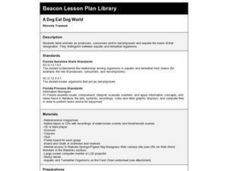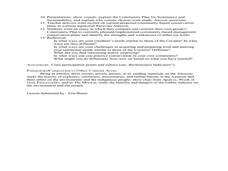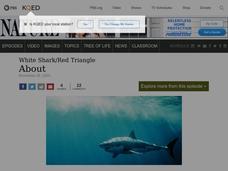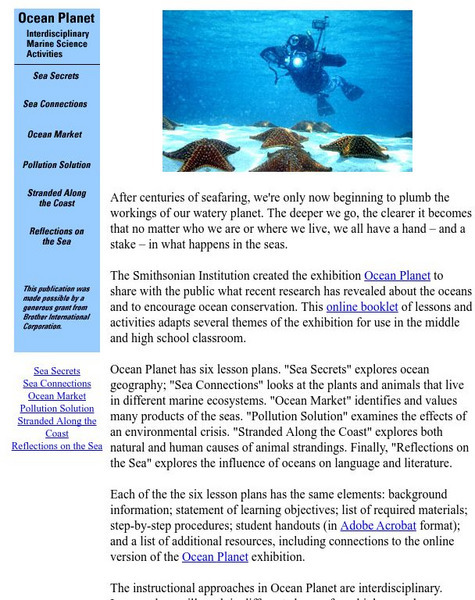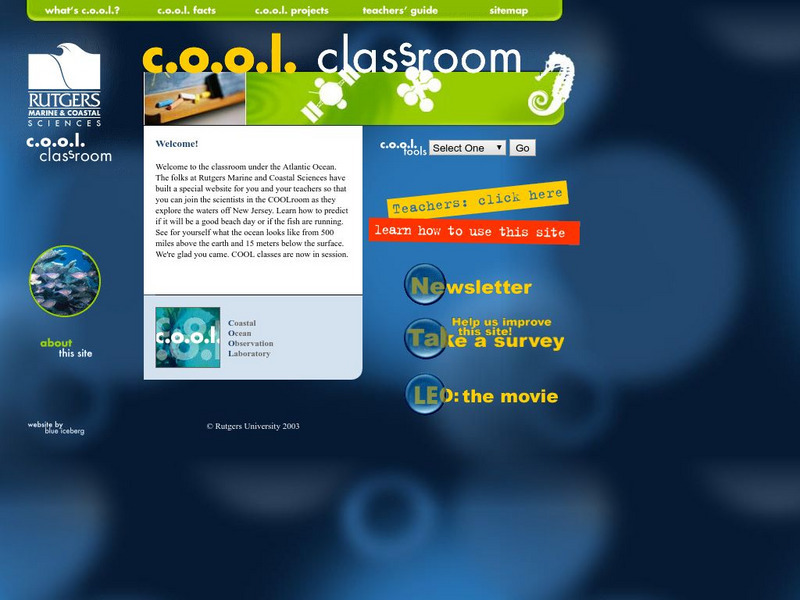Curated OER
Energy Flow in Ecosystems
Middle schoolers, in groups, create a slide show about the ecosystem and answer critical thinking questions based on their research.
Curated OER
A Dog Eat Dog World
Fourth graders distinguish between acquatic and terrestrial organisms. They label animals as producers, consumers, and/or decomposers.
Curated OER
Supermarkets, Sustenance and Sustainability
Students investigate jungles and the people who depend upon them. In this sustainability lesson, students research wild life conservation and discover the importance of a jungle to Amazonian people. Students create a group presentation...
Curated OER
Ecosystems
In this ecosystems worksheet, students complete a crossword puzzle with 35 questions about the different types of ecosystems and organisms in them.
Curated OER
A Natural Connection to the Azores
Students use primary sources to examine whaling voyages, biology, and geography. In this geography lesson, students analyze ship logs and plot locations of animals and determine routes using latitude and longitude.
Curated OER
The Extraordinary Life of the Alaskan Tundra
Students investigate the characteristics of the tundra on the North Slope of Alaska. They conduct Internet research, develop a chart of the types of vegetation, plant growth, and fauna found on the tundra, identify examples in their own...
Curated OER
Water Pollution
Students explore the causes of water pollution. In this environmental lesson, students conduct experiments with natural filtration systems.
Curated OER
Climate and Change: Fitting the Facts Together and Acting on Them
Students examine climate change. In this current events lesson, students read the provided articles "Key Facts + Key Conclusions=0?" "Oil Companies Fund Climate Change Deniers," and "Acting on Climate Change Facts." Students respond to...
Curated OER
Something Fishy
Students identify and discuss the adaptive characteristics and behaviors of fish. They view slides of fish, and design and create a model of a fish of the future, listing the ways their fish adapt to survive.
Curated OER
Gone Fishing
Students examine the effects of various methods of fishing on fish populations and biodiversity. They read a handout, participate in a simulation of different fishing methods, record the results, and answer discussion questions.
Curated OER
Shark Attack
Students examine the white shark. They think critically about a set of shark facts and predict whether the statements are true or false. Students describe a year in the life of a white shark living in the Red Triangle. They create a...
Science Struck
Science Struck: Learn All About the Ocean Food Chain
Read about the different predators, consumers, and producers that make up an ocean food chain.
Smithsonian Institution
National Museum of Natural History: Ocean Planet
Detailed website that was a companion to a 1995 traveling exhibit of the Smithsonian. Links to lesson plans and other educational materials are at the bottom of the page. Enter the exhibition to explore the world of the ocean.
Smithsonian Institution
Smithsonian Education: Ocean Planet
A series of lesson plans designed to be used with the Smithsonian Ocean Planet exhibit (available online). Lesson topics include marine ecosystems, pollution of ocean water, animal strandings, and literature.
Science Struck
Science Struck: Decomposers in the Ocean: Role and Examples
Describes five different types of decomposers that feed on decaying organic matter in the oceans and that are at the bottom of the ocean food chain.
Other
Bigelow Laboratory for Ocean Sciences: Fitting Algae Into the Food Web
A lesson that helps students understand food chains and food webs. With the background information, interactive activity, and extensions, students will see the interconnectedness and interdependence of organisms. Activity has students...
Science Struck
Science Struck: A Helpful Guide to Understand the Photic Zone
The photic zone is the upper layer of the ocean where sunlight can penetrate and support photosynthesis. This article explains the characteristics of this zone, the food chain that exists there, the adaptations of the plants and animals,...
Texas A&M University
Texas A&m University: Fisheries Activities
Site from the Texas A&M University provides activities on fisheries that teachers can use in their classrooms to help students learn more about them. Some of the topics included are ecosystems, ocean food chains, fish prints and more.
Missouri Botanical Garden
Missouri Botanical Garden: Food From the Sea
Did you know that 80% of the fish we eat comes from the ocean? Since oceans cover so much of the earth you would think that we would never be in danger of running out of its resources. Learn how overfishing is causing many problems with...
PBS
Pbs: Secrets of the Ocean Realm
At this site students can read about sea creatures and ocean plant life, and see pictures of each.
World Wildlife Fund for Nature
Wwf: Our Earth: Ecoregions: Habitats: Oceans
An introduction and overview of the ocean habitat, the largest habitat on Earth. Includes links to information about three animals that live in this habitat.
Other
Rutgers Marine & Coastal Sciences: Cool Classroom
Students and teachers can explore the work of marine scientists and observe the ocean from their computers. Learn about Rutgers Coastal Ocean Observation Laboratory, discover why oceanography is important, and see what life is like in...
Other
Digital Library for Earth System Education: Teaching Box: Seasonal Upwelling
A suite of lessons focusing on the process of upwelling. Inquiry-based exploration of seasonal upwelling includes marine food webs, food production in the ocean, wind-driven ocean currents, and seasonal changes in biotic and abiotic...
Georgia Department of Education
Ga Virtual Learning: Marine Invertebrates
Students learn about invertebrates found in the ocean, their individual methods of adaptations, identifying characteristics, and contributions to the marine ecosystem.
Other popular searches
- Ocean Food Chain Pictures
- Atlantic Ocean Food Chain
- Ocean Food Chain Diagram
- The Ocean Food Chain
- Open Ocean Food Chain
- Pacific Ocean Food Chains
- Food Chain Ocean Pollution
- Food Chain in the Ocean
- Ocean Food Chains and Webs
- Food Chain Ocean Biome
- Food Chain Ocean
- Food Chain of the Ocean



